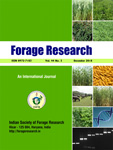M. BENIDIR*, B. BELKHEIR, F. GHOZLANE, A. BOUSBIA AND ET S KALLI
Institut Rational de la Recherche Agronomique d’Algérie, unité de Recherche de sétif, Route des fermes 19000 Sétif
Institut Rational de la Recherche Agronomique d’Algérie, Centre de Recherche de Oued Ghir, 06000 Béjaia
Ecole Nationale Supérieure d’Agronomie d’El Harrach
Université 8 Mai 45 de Guelma, 24000 Guelma
Université de Blida, B.P. 270, route de Soumaa, Blida, Algeria
*(e-mail : moh19ina@yahoo.fr)
(Received : 18 April 2022 ; Accepted : 01 June 2022)
SUMMARY
The Algerian steppe has undergone many ecological and socio-economic transformations. This situation has led to profound changes in livestock farming practices and pastoral mobility. This study described the strategies adopted by steppe agropastoralists in feeding herds under the changing climate conditions in the Djelfa region. 42 transhumant agro-pastoralists were surveyed in two municipalities of Ain El Bel and El Guedid. The results showed that the feed resources of the livestock are of three types: produced on the farm, free provided by the rangelands and purchased (concentrates). New forms of adaptation to the changing context of the steppe implemented by agropastoralists have been identified. Finally, the study has brought some mechanisms and palliative to ensure a sustainable development of agropastoralism in the Algerian steppe.
Key words: climate, feed, sheep herds, steppe, transhumant

